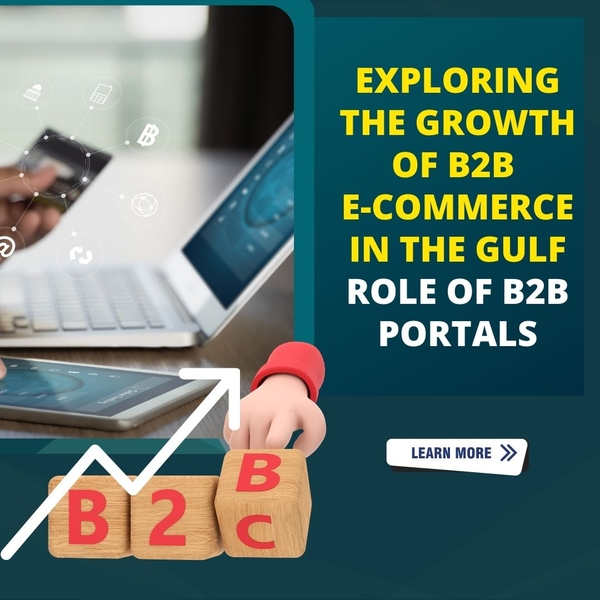
News & Events
The growth of B2B e-commerce in the Gulf region has been significant in recent years, driven by various factors including technological advancements, changing business dynamics, and the desire for increased efficiency and cost savings. B2B portals play a crucial role in facilitating and accelerating this growth. Let's explore this in more detail:
1. Technological Advancements: The Gulf region has witnessed rapid technological advancements, including improved internet connectivity, mobile penetration, and digital infrastructure. These advancements have made it easier for businesses to engage in e-commerce activities, including B2B transactions.
2. Globalization and Market Expansion: B2B portals provide businesses in the Gulf with access to a global market. Companies can find suppliers, distributors, and partners from around the world through these platforms. This has allowed Gulf-based businesses to expand their reach and explore new markets beyond their borders.
3. Efficiency and Cost Savings: B2B portals streamline the procurement process, making it more efficient and cost-effective. Buyers can easily compare prices, specifications, and reviews for products or services, leading to better purchasing decisions. Sellers benefit from reduced marketing and distribution costs, as well as improved inventory management.
4. Enhanced Transparency: B2B portals provide transparency in terms of pricing, product information, and transaction history. This transparency builds trust between buyers and sellers, which is crucial in B2B transactions, where large sums of money are often involved.
5. Improved Communication: B2B portals facilitate real-time communication between buyers and sellers. This includes features such as messaging systems, chatbots, and customer support, which help businesses resolve inquiries and issues quickly.
6. Data Analytics: B2B portals often offer data analytics tools that enable businesses to gain insights into their transactions, customer behavior, and market trends. This data-driven approach helps in making informed business decisions and developing effective strategies.
7. Regulatory Compliance: B2B portals can assist businesses in the Gulf region in complying with local regulations and trade laws. They can provide information on import/export procedures, tariffs, and customs documentation, helping businesses navigate complex compliance requirements.
8. Marketplaces and Specialization: Some B2B portals are specialized in specific industries or sectors, allowing businesses to find partners or suppliers with expertise in their niche. These specialized platforms cater to unique needs and requirements, fostering deeper industry-specific connections.
9. Ecosystem Development: B2B portals often foster the growth of an e-commerce ecosystem by connecting various stakeholders, including manufacturers, wholesalers, distributors, logistics providers, and financial institutions. This ecosystem approach creates a holistic environment for B2B trade.
10. Adaptation to COVID-19: The COVID-19 pandemic accelerated the adoption of B2B e-commerce as businesses sought digital solutions to cope with disruptions. B2B portals played a vital role in ensuring business continuity during challenging times.
In conclusion, the growth of B2B e-commerce in the Gulf region is driven by a combination of factors, with B2B portals playing a pivotal role in enabling businesses to connect, transact, and thrive in an increasingly digital world. As technology continues to evolve and businesses seek more efficient and cost-effective ways to conduct trade, the role of B2B portals in the Gulf's e-commerce landscape is expected to expand further.